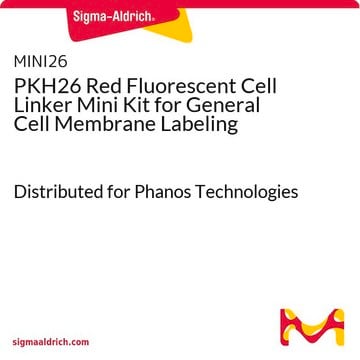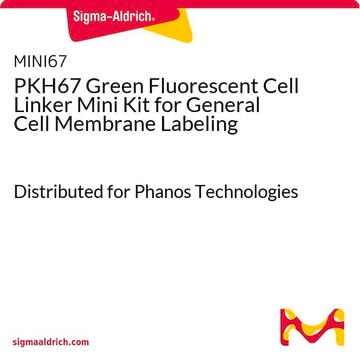SCT011
LuminiCell Tracker 670- Cell Labeling Kit
Biocompatible organic fluorescent nanoparticles (AIEDots) that can be used to label cells for long term cell tracking and cell tracing in vitro and in vivo experiments.
Sinónimos:
AIEDots Cell Tracker Dye, AIE Live Cell Fluorescent Dye, Fluorescent Cell Tracking Dye, Live Cell Fluorescent Nanoparticles
About This Item
Productos recomendados
Quality Level
technique(s)
cell culture | mammalian: suitable
detection method
fluorometric
shipped in
ambient
General description
Emisson Maximum: 670nm
Suggested Filters:
Excitation: 458/488/543nm
Emisson: 670-800nm
The Luminicell Tracker<TMSYMBOL></TMSYMBOL>-670 Cell Labeling Kit contain red fluorescent AIEDot nanoparticles with TAT sequences. These nanoparticles can be used to fluorescently tag cells for long term cell tracking and tracing experiments.
Features and Benefits
● Brighter: 10X brighter than other cell labeling technologies
● Photostable: 3X longer fluorescence without signal quenching
● Biocompatible: Non-toxic organic nanoparticles intended for biological applications
● Rapid Protocol: Easy-to-use protocol labels cells within 4 hours
Quality
Concentration: 180-220nM
Fluorescence: 665+/- 10nm
Brightness at 670nm: ≥1.7X10^7 M-1cm-1
Cellular Assay: HeLa Cell Fluorescence
Physical form
Storage and Stability
Note: Some particulates may form as a result of nanoparticle aggregation during shipping. To get particulates back in solution, sonicate the vial containing LuminiCell Tracker three times for 1 min each before use.
Disclaimer
Storage Class
12 - Non Combustible Liquids
wgk_germany
WGK 2
flash_point_f
Not applicable
flash_point_c
Not applicable
Certificados de análisis (COA)
Busque Certificados de análisis (COA) introduciendo el número de lote del producto. Los números de lote se encuentran en la etiqueta del producto después de las palabras «Lot» o «Batch»
¿Ya tiene este producto?
Encuentre la documentación para los productos que ha comprado recientemente en la Biblioteca de documentos.
Artículos
Biocompatible organic fluorescent nanoparticles (AIE Dots) that can be used to label cells and vasculature for long-term live cell tracking and tracing experiments.
Biocompatible organic fluorescent nanoparticles (AIE Dots) that can be used to label cells and vasculature for long-term live cell tracking and tracing experiments.
Biocompatible organic fluorescent nanoparticles (AIE Dots) that can be used to label cells and vasculature for long-term live cell tracking and tracing experiments.
Biocompatible organic fluorescent nanoparticles (AIE Dots) that can be used to label cells and vasculature for long-term live cell tracking and tracing experiments.
Nuestro equipo de científicos tiene experiencia en todas las áreas de investigación: Ciencias de la vida, Ciencia de los materiales, Síntesis química, Cromatografía, Analítica y muchas otras.
Póngase en contacto con el Servicio técnico








